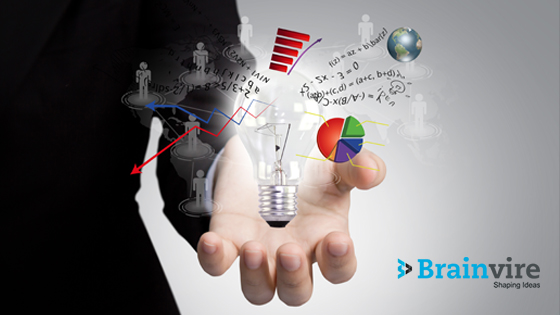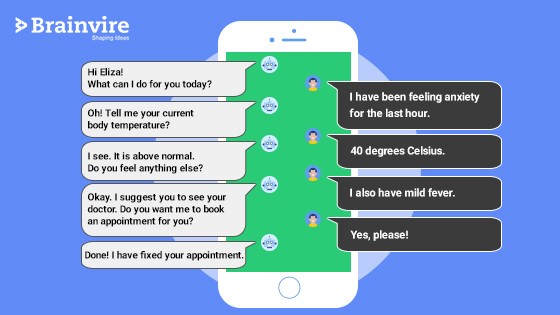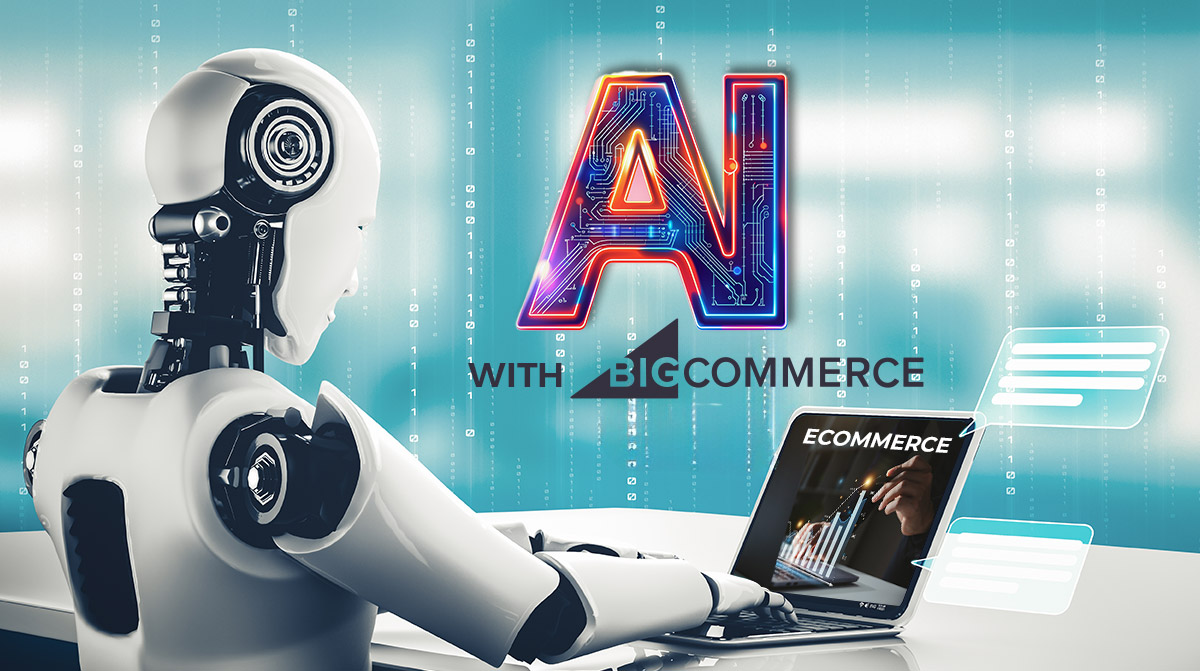The medical industry has witnessed a significant transformation due to the remarkable impact of Artificial Intelligence (AI). When doctors successfully save a patient’s life, they are elevated to a status akin to that of divine beings. In today’s world, where the relentless pursuit to discover new diseases persists, healthcare professionals are increasingly embracing technological advancements to enhance their abilities and save more lives. AI Impact on Medical diagnostics is multifaceted, revolutionizing healthcare by enabling more precise diagnoses, personalized treatments, and ultimately leading to improved patient outcomes. AI Impact on Medical diagnostics will change the way of treatments. Furthermore, AIs impact on medical diagnostics holds the potential to enhance early detection of diseases, enabling interventions at the earliest stages and potentially saving lives.
Medicines cure diseases. But only doctors cure patients.” — C.G. Jung.
AI’s Role In Diagnostics And Medical Imaging
Even with the experience of doctors, there are situations that demand complex decision-making. In such cases, the value of Artificial Intelligence becomes evident, as they showcase the efficiency of diagnoses with remarkable speed and accuracy. By minimizing human error, AI/ML technology significantly enhances patient outcomes across various sectors.
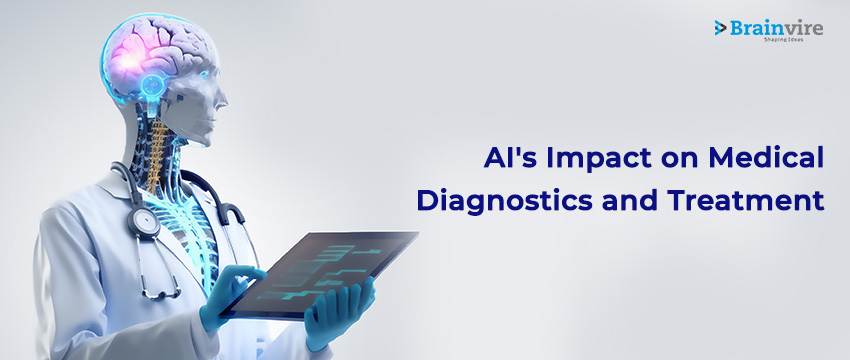
How AI improves Decision Making For Doctors
Arriving at a decision requires several calculations and analyses. AI’s remarkable ability reduces decision-making time by far. Algorithms process huge amounts of patient data, including medical records, lab results, and imaging studies, at an unprecedented speed. Faster decisions make quick diagnosis and treatment possible when the cases involve multiple conditions and complex procedures.
Improved Patient Outcomes And Reduced Human Error
AI models undergo training using vast datasets of medical images and reports, enabling them to effectively identify abnormalities such as tumors, lesions, or fractures in medical scans. This advanced technology provides radiologists with precise and analytical insights, facilitating more accurate diagnoses and guiding patients through the best course of action. By harnessing the power of AI and Deep Learning capabilities, healthcare professionals can enhance their diagnostic accuracy and decision-making, leading to improved patient outcomes and streamlined treatment processes.
Harnessing AI For a Stronger Response In Epidemics And Pandemics
From monitoring health status to facilitating rapid response, AI is an effective mechanism for combating and managing epidemics and pandemics. Here are a few ways:
- Aiding public health authorities with early signs – Moreover, AI can actively monitor social media, news reports, and healthcare databases to identify potential outbreaks. By detecting early warning signs, public health authorities can promptly respond and announce or implement preventive measures.
- Resource allocation- Additionally, AI can assist in emergencies by aiding in capacity planning, resource allocation, and the development of effective containment strategies.
- Forecasting – Moreover, AI can evaluate the disease’s impact and simulate various scenarios by utilizing predictive analysis and machine learning techniques.
- Contact Tracing – During epidemics and pandemics, the task of monitoring disease spread can become chaotic. AI is effective in tracking and tracing potential exposures and the prompt notification of individuals who may have come into contact with an infected person.
- Vaccine development – AI accelerates trials and optimizes patient selection by analyzing real-time clinical trial data. Machine learning algorithms aid vaccine development by predicting immunogenicity, antigenic variation, and potential adverse effects. Risk communication – Addressing misinformation is a priority in pandemics. Officials can utilize centralized, automated messaging systems, chatbots, and virtual assistants to enhance public awareness, promote adherence to preventive measures.
Applications Of AI In The Medical Field
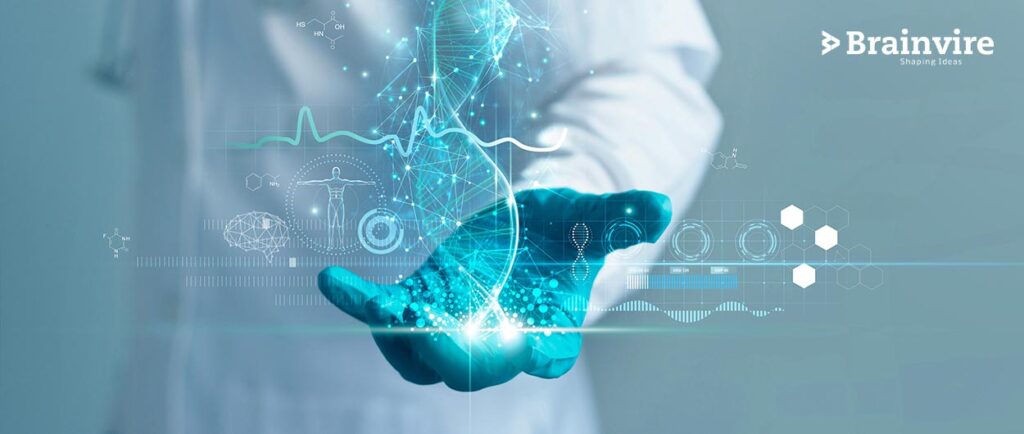
Virtual Medical Assistants
AI-powered assistants, such as chatbots or virtual agents, can interact with patients, answer their questions. AI can offer real-time guidance in managing health conditions, tracking medications, sharing information with healthcare providers, and sending appointment reminders.
[you may like to read: 4 Real Life Business Use-Cases of Chatbots]
Electronic Health Records (EHR) And Data Analysis
AI eases healthcare professionals’ burden by automating patient data entries, freeing up more time for patient care. Additionally, AI can detect trends, highlight errors, and generate models for valuable insights on disease progression and treatment outcomes.

These insights not only benefit patient care but also contribute to advancements in medical research. Through harnessing the analytical power of AI, healthcare professionals can acquire valuable insights to foster innovation and enhance healthcare outcomes.
Robotic Surgery
Robotic surgical systems feature robotic arms, surgical instruments, and a console for surgeons to operate via a 3D visual interface. Compared to traditional open surgery, robotic surgery delivers precise incisions, reduced blood loss, faster recovery times, and fewer complications.
Monitoring Health Electronically
Technology enables patients, caretakers, physicians, and other healthcare providers with timely assistance in health care. For example, mobile apps can analyse patient data, monitor vitals and inform immediately in case of fluctuations.
Conclusion
With AI-driven solutions revolutionizing healthcare, treatments are becoming faster and more accurate. The advantages of adopting AI in medicine outweigh any associated costs and concerns. Despite the challenges, the progress in robotics will ultimately yield affordable and easily accessible options, thereby unveiling new and exciting possibilities in the field of surgery. It is crucial to address challenges and limitations, including data privacy and ethics. Collaboration with human expertise is vital. As AI technology advances, it promises to reshape healthcare, enhancing precision and personalization and effectively combating epidemics to safeguard public health.
[Keep reading: Developing An AI-Based Pharmacy Solution For A Eminent Healthcare Entity In Saudi]
Related Articles
-
Prominence of Business Intelligence in the Success of Any Business
The world today is demanding smarter processing and use of technologies that can possibly automate or ease out every possible task. And many companies have started adopting business intelligence in
-
Chatbots: Your New Healthcare Assistant
Chatbots, or a talking software programs or smart algorithms which dexterously conduct conversation via auditory or textual methods, are becoming popular and widespread. They have been proving its mettle in
-
How Combination of BigCommerce and AI Helps E-commerce
In the rapidly changing e-commerce world, businesses constantly strive to enhance consumer experiences, generate more money as well as make their processes less complicated. BigCommerce is one of the leading


